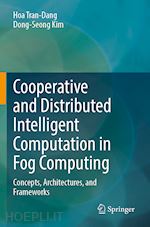
Questo prodotto usufruisce delle SPEDIZIONI GRATIS
selezionando l'opzione Corriere Veloce in fase di ordine.
Pagabile anche con Carta della cultura giovani e del merito, 18App Bonus Cultura e Carta del Docente
This informative text/reference presents a detailed review of the state of the art in fog computing paradigm. In particular, the book examines a broad range of important cooperative and distributed computation algorithms, along with their design objectives and technical challenges.
The coverage includes the conceptual fundamental of fog computing, its practical applications, cooperative and distributed computation algorithms using optimization, swarm intelligence, matching theory, and reinforcement learning methods. Discussions are also provided on remaining challenges and open research issues for designing and developing the efficient distributed computation solutions in the next-generation of fog-enabled IoT systems.











Il sito utilizza cookie ed altri strumenti di tracciamento che raccolgono informazioni dal dispositivo dell’utente. Oltre ai cookie tecnici ed analitici aggregati, strettamente necessari per il funzionamento di questo sito web, previo consenso dell’utente possono essere installati cookie di profilazione e marketing e cookie dei social media. Cliccando su “Accetto tutti i cookie” saranno attivate tutte le categorie di cookie. Per accettare solo deterninate categorie di cookie, cliccare invece su “Impostazioni cookie”. Chiudendo il banner o continuando a navigare saranno installati solo cookie tecnici. Per maggiori dettagli, consultare la Cookie Policy.